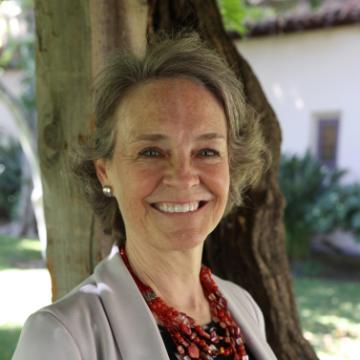
Listening for the Power of a Jesuit Education

By Alison M. Benders
Vice President of Mission and Ministry Division,
Santa Clara University
“The real measure of our Jesuit universities lies in who our students become ... and the adult Christian responsibility they will exercise in the future towards their neighbor and their world.” —Superior General Hans Peter Kolvenbach, S.J. (Santa Clara lecture, 2000)
One Sunday, at the 10 a.m. community Mass in the Mission Church, a Latin American immigrant couple introduced their family to me and proudly shared that their son had just started his first year at Santa Clara University. The father had attended a Jesuit high school in his home country, so the parents were justifiably pleased that their son had started here. While I heard in their voices deep confidence in the value of a Jesuit education for their son, I also listened deeply for the substance of their confidence. In similar conversations with alumni, I sometimes probe further: “What memories or thoughts come to mind when you say ‘a Jesuit education’? What was meaningful about your time at SCU?” These questions are field research for the Division of Mission and Ministry, because the division is charged with fostering and celebrating SCU’s Jesuit, Catholic mission.
After spending a year in Ignatian reflection and dialogue, the faculty authors in this volume also offer their perspectives on the power of a Jesuit education. I hear three broad areas of consensus in their essays. First, a Jesuit education is directed toward a common, social good beyond the individual, aimed at building up the community. St. Ignatius understood the fundamental purpose of our human lives in their universal, eternal context as serving God and serving all God’s people. This fundamental purpose thus must also be the purpose of all our works. When the Jesuit mission becomes authentically expressed in Jesuit higher education, universities as Jesuit apostolates advance the proyecto social, or social project. Education at Jesuit institutions must be directed to educating citizens who will “build a more humane, just, and sustainable world” as SCU’s vision states.
Second, we can frame Jesuit education as a form of communication, which to be effective must attend to content and relationship. In addition to academic disciplines that may be components of any university, a humanistic core and Ignatian values are the distinguishing content of a Jesuit curriculum. This content enables us to identify and explore the important dimensions of being human and living in community. In academic and cocurricular programs, the university conveys the contours of a just, equitable society. Moreover, the humanistic core, with all its dimensions, becomes deeper and richer, more available and compelling, when it is built upon the foundations of the Catholic intellectual tradition and Catholic social teaching. Jen Norton, Novato Sunrise, 2020
But content, whether concrete, instrumental, or theoretical is not enough. This is the third and most essential moment of consensus among the faculty authors. Rather, the power of a Jesuit education consists in the integral formation of the human beings who learn, work, and live together on campus. Through human relationships, particularly friendship and mentoring, one generation shapes the character of the next, and a community practices how to live together according to the values they profess.
Several of the essays cautioned about a fundamental lack of integrity between an intellectualized vision of the proyecto social and its practice on our campus. This is the call to move from theory to practice. For SCU’s graduates to become citizens of a more humane, just, and sustainable global community, their intellect and character must be integrally developed, cura personalis. This formative care includes direct person-to-person experiences of diverse people and situations; skill in practices of dialogue, reflection, and discernment; safe and supportive structures that enable them to practice new ways of relating; and models, whether personal or organizational, that demonstrate the authentic integration of a social vision with everyday life. They must practice the skills for building a just world.
As I listened to the voices of faculty, I felt their hope for SCU’s embodiment of Jesuit values on campus and beyond. Their reflections call me, and all readers I hope, to meet the challenges they identified. Ignatius’ admonition to serve God can be expressed in our day as caring for humanity’s common good and common home. This is the why of Jesuit education of which the authors write. Content and formation are the way of Jesuit education, which the faculty authors so prophetically preach and model. The power of a Jesuit education lies in neither its distinctive content nor its innovative educational experiences.
The power of a Jesuit education comes from our practically developed self-understanding as a people united in a common, social project. This proyecto social nurtures the value of all people and of the earth we inhabit. Driving toward this goal, a Jesuit education integrates the minds and hearts of students, forming them with “competence, conscience, and compassion” so that they may live together companionably and peacefully. Let us all commit to the project of hope we recognize as a Jesuit education.
Alison M. Benders is vice president for the division of mission and ministry at Santa Clara University. Prior to this role, she served for seven years as the associate dean of the Jesuit School of Theology at SCU, where her teaching and writing focused on racial justice and reconciliation. Next month Liturgical Press will release her book: America’s Original Sin: A Pilgrimage of Race and Grace, which is a reflective immersion into our nation’s history of racial injustice through personal and theological lenses.